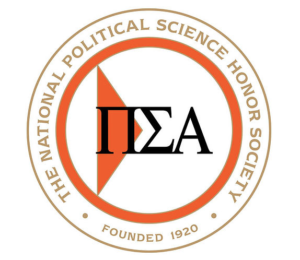Sixty footnotes, 22 sources, 19 pages, one prize-winning paper.

For its author, recent University of Mary Washington graduate Dillon Schweers ’21, it was quite the process – determining an area of interest, digging in to narrow the scope, poring through research, and writing and rewriting drafts.
The workload was worth it, said Schweers, a political science major now in his first year at William & Mary Law School.
“It’s about sharpening your writing skills,” he said. “At the end of the day, that’s what employers and grad programs are looking for.”
His piece, “Violence Against Journalists in Mexico,” was named best undergraduate paper in this year’s Pi Sigma Alpha national writing contest. It’s the latest in a string of victories for Mary Washington students, who have claimed first-place or runner-up spots in the competition 11 times in the past two and a half decades, outperforming nearly every other four-year school in the country.
“The success of our political science majors, year after year, proves just how much they excel,” said Professor Stephen Farnsworth, advisor for Schweers’ award-winning project. “UMW students regularly defeat those studying at the nation’s most famous universities.”
Indeed, Mary Washington student names appear alongside those from Georgetown, Rutgers, Tufts and Emory universities, the U.S. Air Force Academy, University of Vermont and other top-tier contenders on the Pi Sigma Alpha best papers page.
Over the years, winning Mary Washington works have explored such topics as voting trends, presidential leadership styles and the role of women in politics. Class assignments, independent study projects and honors theses bloom throughout a semester, sometimes more, into champion essays under the close watch of faculty. The process involves one-on-one meetings between students and professors, plenty of feedback and loads of revisions.
“This is a really important part of what Mary Washington is and what we do,” said Professor of Political Science and International Relations Jason Davidson, who serves as UMW’s Pi Sigma Alpha chapter advisor. “Students are getting that sustained focus on their work by faculty members.”
More than a decade after Justin Simeone ’08 penned his runner-up honors thesis – “Crisis or Constitution? Rethinking Judicial Deference on Administrative Detention in the United States, the United Kingdom and Israel” – he recalls his intense collaboration with Davidson. The piece, which compares judicial responses to policies spawned by the Sept. 11 terrorist attacks, involved grants to conduct field study abroad and two years of planning, research and writing.
“This impressive record is a testament to the personal mentorship and careful guidance that dedicated individuals like Professor Davidson provide to Mary Washington students, creating academic opportunities that meet or exceed those available at the most prestigious universities,” said Simeone, an attorney who subsequently studied at the London School of Economics, Princeton University and the Georgetown University Law Center.
 More than 800 Pi Sigma Alpha chapters exist nationwide, with more than 30 in Virginia alone. Chapters submit a single entry in each of two categories in the annual contest – best class paper and best thesis. Winners and runners-up, chosen by faculty judges, are seen as stand-outs among political science majors across the country.
More than 800 Pi Sigma Alpha chapters exist nationwide, with more than 30 in Virginia alone. Chapters submit a single entry in each of two categories in the annual contest – best class paper and best thesis. Winners and runners-up, chosen by faculty judges, are seen as stand-outs among political science majors across the country.
“A committee of well-respected scholars in the field look at your work, and they have only a few awards to give,” Davidson said. “It’s an important honor to have on your résumé.”
The timeline below lists the 11 UMW students who have won or received runner-up status in the Pi Sigma Alpha political honor society’s national writing contest since 1997.
2021 – Dillon Schweers, national winner for Best Undergraduate Paper: “Violence Against Journalists in Mexico”
2017 – Kendall Parker, runner-up for Best Undergraduate Paper: “A Comparison of Female Conscription: Israel v. U.S.”
2011 – Annie Morris, runner-up for Best Undergraduate Paper: “Persuasion and the Bully Pulpit: Expanded Evidence on Strategies of Presidential Leadership”
2010 – Nicholas Jacobs, national winner for Best Undergraduate Paper: “Professional Reputation: Why the First Year of the Presidency is Overstated”
2008 – Justin Simeone, runner-up for Best Undergraduate Honors Project: “Crisis or Constitution? Rethinking Judicial Deference on Administrative Detention in the United States, the United Kingdom, and Israel”
2003 – Erik Johnston, runner-up for Best Undergraduate Paper: “The Non-Voter Puzzle Solved: Weak Partisanship Explains Demographics That Do Not Match Candidate Preference”
2002 – Ryan Balis, national winner for Best Undergraduate Honors Project: “Televised Presidential Debates and Exposure: Partisan, Ideological and Demographic Characteristics”
2000 – Sara Barokas, runner-up for Best Undergraduate Paper: “Political Women: Participation, Orientation and Party Identification”
1999 – Edwin Egee V, runner-up for Best Undergraduate Paper: “Gaining Support Through Casework: A Quantitative Study of Contactors and the Support They Give Their Representative”
1998 – Anne Daugherty, runner-up for Best Undergraduate Paper: “Feminists and Conservative Women: From the Time of ERA to the Present”
1997 – Luke Sbarra, national winner for Best Undergraduate Paper: “Whither China: Marketization Without Democratization?”